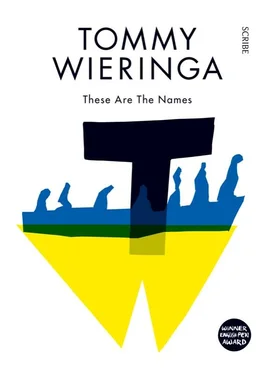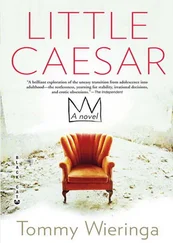If she thought he was funny, then maybe she thought he was intelligent, too. It was a conclusion he arrived at by fits and starts. He had never thought of himself that way. At the police academy he had advanced easily into the officers’ training program; they tested your intelligence beforehand, but it mostly had to do with assessment skills and reaction times. In those respects he was among the best, but he attributed intelligence to the biochemists in their labs and the rocket scientists at their bases — not to a police sergeant with only six years’ experience.
In January, in the third season of their love, she grew quiet. ‘It’s the winters here,’ she said. ‘They last so long. It makes me gloomy.’
Often, she didn’t answer the phone. Sometimes, after it had kept on ringing, she would answer and say: ‘I was just getting ready to call you back.’
He longed for spring, when his ice queen would thaw and they could continue where they had left off. Her eyes would shine again when she looked at him. She would laugh again, for no matter how he joked these days, her broad laugh had vanished. A regretful little smile had taken its place. She often felt more like staying at home alone. ‘I don’t feel so good, Pontus; I’d rather be alone tonight. Maybe I’ll feel better tomorrow.’
When she wasn’t alone, she went out with girlfriends whose names he’d never heard before.
‘Tomorrow’ became the pivotal point of their relationship, comparable to the jokester who had written ‘Tomorrow, free vodka’ on the wall behind the bar at the academy. If only the damn winter would pass. If only spring would come. Tomorrow. Tomorrow, free vodka.
He said: ‘You’re so quiet’ and ‘What are you thinking about?’, and knew that she would never thaw. Even before the ice melted on the river, she would dispose of him.
When at last she told him on the phone that she’d had enough (in fact, she’d said: ‘I can’t go on anymore’, as though she’d been engaged in hard physical labour), he saw it as nothing but a formality, and knew that he would never again be so happy.
In the deepness of the night, the boy awoke to a cloudburst over the steppes. The rain hissed. He peeked out from beneath the plastic, but didn’t see the slight glow that announced the day. He pulled his head back quickly. The tarp was leaking in a few places, so he tried to lie down in a way that would keep him from getting wet. Fat drops drummed on the plastic. The cold had seeped deep into his bones; he never felt warm anymore. It seemed as though there was no limit to what they could endure. Only death could keep them from wandering off each day anew through the vastness.
He thinks about the tall man, but the memory of his obscene nakedness is already fading. Already the sand has almost covered him.
The boy rolls up in a ball and waits with open eyes for morning.
Little by little, the black man came closer. He added himself to the group again bit by bit — first an arm and then a leg.
But his approach did not go unnoticed. The woman looked back often. She stayed close to the man from Ashkhabad.
Rain. Nothing but rain. No one had had a dry piece of clothing on them. The boy saw the hunched silhouettes behind him — the ghosts of the deceased, awakened from the sleep of ages.
The dark, shuffling forms returned in his fearful dreams.
How far can you walk without ever coming to a road or village? It’s as though they’ve begun circling the globe all over again. Maybe the world has perished without their noticing. Are there still people? the boy wonders. Where are they hiding? Coming across a goat or a cow would be a major miracle in itself! The joy! First they would cover the cow with kisses and blessings, then slaughter her and devour her whole. A cow — oh, if only they would find a cow. If he was the first to find her, he would hop on her back and ride off. He would leave the others behind and enter the new world on the back of his cow. He could see the streets strung with banners, people coming out of their houses to cheer on the one who had survived the steppes — the cow’s back festooned with cookies and banknotes, sweets and garlands. The cow stopped before the house of the woman with gleaming hair; that’s where it lived. The woman bathed him, swathed him in soft linen, and tucked him into the softest bed he had ever lain in.
He would sleep for seven days and seven nights …
Without noticing it, he had moved out far ahead of the rest. He looked back. The man from Ashkhabad was waving his arms wildly, the tall man’s stick in his hand. Another fight? Were they ever too tired to fight? Someone left the group and walked on. The poacher. The woman followed, then the other two. The boy squinted — at a little distance from the others, he saw movement. The black man. He wasn’t giving up. It was a pointless pursuit. He would never be one of them anymore; the fear had acquired the force of law. They would beat him to death if he came too close.
The rainwater gathered in pools. Leaning on his left hand, the boy scooped up water with his right and raised it to his lips. After each sip he looked up, then drank on. He heard a voice — there were the others. He saw the hollow-eyed skulls emerging from the grey rain, their hair in strands against their scalps. They walked past him in silence.
The boy walked a little ways behind the woman, alone with his thoughts.
Sometimes the woman stopped. She leaned over and picked something up. She raised it to her lips. When she bent down again, the boy was on her in one giant step. ‘What have you got there? What are you eating?’
To his dumb amazement, he saw that she had scooped up a handful of wet earth and was eating it. Sand stuck to her lips. She swallowed with difficulty and took another bite. The boy seized her by the shoulders, his face contorted in disgust. ‘Stop that!’
She ignored him.
‘You can’t eat sand! People don’t eat sand!’
The woman wiped her lips.
He tried to reason with her. Why was she eating sand? It was bad for her; she had to stop. Was she trying to kill herself?
She smiled faintly and looked at him without seeing him. ‘Let me go,’ she said. ‘It will be all right. If that’s what God wants.’
Inky clouds rolled together and parted again above their heads. The boy walked on alone once more, heavy with gloom. They were doomed. There was no hope for them anymore.
Yet still, yet still.
Inside him was the strange conviction that he would survive. He would be among the saved.
But the woman scooped up sand. She was lost. You shouldn’t eat sand. It was admitting defeat.
A few families lived in his village. For as long as anyone could remember, they had built terraces on the mountainsides, stone walls chest high, filled with dirt. Without those basins of piled stones, the soil would have washed down the rusty slopes right away. No fertile soil could be found at those altitudes, so they bring it up from the valley. They load the fertile soil onto the backs of donkeys, in the beds of pick-ups and little trucks, and even fill their pockets with it before starting on the long, windy road up. Bit by bit, they carry their land into the mountains. All the land they possess they have carried up themselves. Nothing is more costly to them than that dark soil which produces scanty cabbage, pumpkins, potatoes, and onions.
Boys keep watch on wooden scaffolding. The wind rustles in the dry leaves of corn; with slingshots, they fire stones at crows. When they hit one, they hang it upside-down on a stick as a warning to its comrades.
And if anyone asks them why they do that, why they live in a place suited only to carrion crows and vultures, a place that has to be overcome, they shrug and say that’s what they’ve been doing for as long as anyone can remember.
Читать дальше











